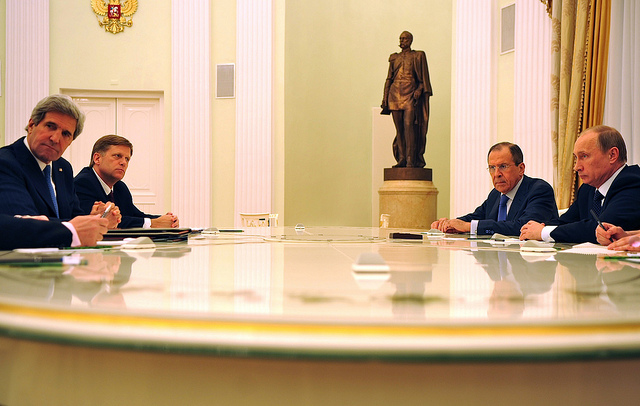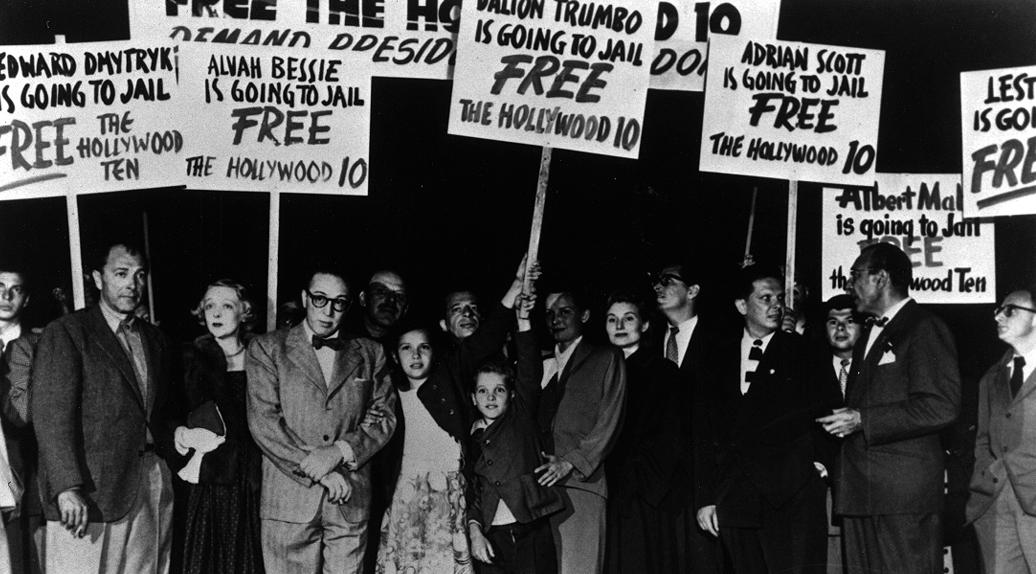What Is Election ‘Meddling’ and When Did Everyone Start Using That Term?
Former acting solicitor general Walter Dellinger tweeted a question last week:

Published by The Lawfare Institute
in Cooperation With

Former acting solicitor general Walter Dellinger tweeted a question last week:
Who decided that the right word for the Russian military/intelligence
— walter dellinger (@walterdellinger) July 23, 2018
attack on our democratic election was "meddling"? This trivializing term is defined as to "busy oneself unduly with something that is not one's concern" The attack was that, of course, but so much more.
The answer turns out to be amusing: The word “meddling” in this context entered the American lexicon because of a rare partnership between an unlikely duo: Russian President Vladimir Putin and former U.S. ambassador to Russia Michael McFaul—a man Putin now famously wants to interrogate. And it was popularized shortly thereafter in the wake of an interview by Hillary Clinton’s campaign manager—an interview in which, oddly enough, the word was never spoken.
Individuals involved in L’Affaire Russe face a wide array of charges: offenses as varied as conspiracy, acting as an agent of a foreign power and aggravated identity theft. No one faces charges of “meddling,” namely because meddling is not actually a crime. And as Dellinger says, meddling doesn’t sound particularly threatening either. Yet some of the most senior U.S. officials accuse Russian individuals and entities of “meddling” in U.S. elections on a regular basis. And the term has caught on in media discussion of Russian electoral interference. In just the past two weeks:
- The director of national intelligence released a statement July 16 affirming the intelligence community’s “assessments of Russian meddling in the 2016 election.”
- The president tweeted a Fox News headline July 19: “Trump recognized Russia Meddling MANY TIMES.”
- And Senate Republicans opposed a bill last Wednesday that would seek to prevent foreign nations from “meddling in an election” as Russia did.
The problem with the term, as Dellinger’s tweet pointed out, is that its meaning is intentionally vague. Meddling sounds like something overbearing relatives do to your personal life. Russian “meddling” in U.S. elections could refer to activities from vandalizing a polling station to endorsing a candidate. It doesn’t sound like a years-long, coordinated influence campaign to sow discord with the intention to help elect a certain individual to the most powerful office in the world.
So when did references to any and all of Russia’s actions become “meddling”? The answer turns out to be surprising.
Back in September of 2015, Putin sat down with journalist Charlie Rose to discuss the address Putin was about to give before the United Nations General Assembly. President Barack Obama and Putin had traded barbs the previous week regarding Russian actions in Ukraine, and Rose asked the Russian president to comment on his opinions about Obama’s foreign policy prowess. Putin declined to answer and, instead, went on a rant about, of all things, the 2016 U.S. presidential election: “An election campaign will soon start in the United States. They always play either Russian card or any other, political opponents bring accusations against the current head of state and here there are a lot of lines of attack.” Putin concluded with an entirely unsolicited denial: “I will not meddle in America’s internal political squabbles.” (Notably, the word “meddling” appears in the Kremlin’s official translation of the interview whereas in the “60 Minutes” transcript Putin said he has no intention to “get involved.”)
With the benefit of hindsight, we now know that Putin had already ordered a massive influence campaign in the 2016 election by the time he made these comments. He not only had the intention to “meddle” in the election but hackers with Russian ties had already gained access to the Democratic National Committee’s network earlier that year.
The media paid little attention to Putin’s comments. In context, this is not altogether surprising. Donald Trump had announced his candidacy only three months before. At the time Putin spoke, there were still 15 Republicans and six Democratic candidates in the presidential race. No one was talking about DNC hacks or Russian Twitter bots. Certainly no one was accusing Russia of “meddling.” And Putin may simply have been trying to say that he was not going to comment on internal U.S. politics. But in retrospect, the comment is striking.
Fast-forward nine months, to June 14, 2016, when the Washington Post broke the story that hackers backed by the Russian government had gained access to the Democratic National Committee’s network. Major media outlets didn’t refer to the hack as “meddling” in their initial articles. But one person did use that particular term: former U.S. ambassador to Russia Michael McFaul.
In an interview with Politico, McFaul claimed that the attack on the DNC meant Russia was “meddling in our personal affairs.” Notably, it appears that McFaul intended for the word “meddling” to mean that Russia “wanted to obtain the information without it being detected,” not that Russian military intelligence wanted to impact or change the election results: “Whether they were doing it to try to manipulate our political process, I’d have to think about that.”
McFaul’s phrase was not picked up by the media at large at the time. Indeed, no one repeated his terminology over the next few days.
On June 17, Putin jumped back into the conversation. CNN’s Fareed Zakaria interviewed a panel of world leaders, and Putin took the opportunity to declare, again unsolicited, that he had no intention of meddling in U.S. elections. Zakaria asked Putin about having previously said that he believed Trump to be “brilliant,” and Putin, in a seeming non sequitur, responded that while U.S. elections are generally undemocratic, he had no intention of getting involved in this one: “as the German say, it's not our beer to meddle with it … [and] when the U.S. elects a president we are going to work with anyone.” Again, Putin was not referring to the hacking but generally disclaiming involvement in U.S. politics.
Despite the statements of McFaul and Putin, “meddling” remained pretty marginal. Slate magazine published an article July 4 that asked, “Is Putin already meddling in this campaign?” but that was about it.
The breakthrough came July 24, when Clinton campaign manager Robby Mook told CNN that he believed Russia was releasing DNC emails to help Trump win the election. Use of the term meddling exploded after Mook’s interview. It showed up in dozens of news articles and political commentary by the end of the day, including in the New York Times and Fox News, and Trump campaign chairman, Paul Manafort, used the term on CNN. From then on, meddling has been part of the conversation.
But here’s the funny thing: Mook never actually used the word “meddling.” Here’s what he did say: “What’s disturbing to us is that we — experts are telling us that Russian state actors broke into the DNC, stole these emails, and other experts are now saying that the Russians are releasing these emails for the purpose of actually helping Donald Trump.”
And here’s how various media outlets covered it at the time:
- The New York Times: “An unusual question is capturing the attention of cyberspecialists, Russia experts and Democratic leaders in Philadelphia: Is Vladimir V. Putin trying to meddle in the American presidential election?”
- Clinton campaign chief strategist Joel Benenson on Fox News: “all these emails that were being apparently selectively leaked by these actors acting in concert with Russia, that’s a serious problem that we have to be concerned with, if they’re trying to meddle in what we believe was a fair and honest election.
- CNN anchor Erin Burnett in an interview with Trump’s campaign chairman, Manafort: “But would you also agree it’s completely and utterly inappropriate for Russia to in anyway be meddling in the American election?”
Can Putin and McFaul be credited with the current association between the term meddling and L’Affaire Russe? Sort of. They both used the word in closely related contexts in the period before its popularization. But their comments were not reported widely, nor were they repeated by politicians. They may, however, have primed the public’s subconscious for Mook’s later interview.
Their comments, and the subsequent lack of media attention, raise an interesting question, however: Why was the June 14 report of the DNC hack not reported on widely as “meddling,” while the July 24 accusation that Putin was helping Trump was?
The main difference between the two, as far as I can tell, is that the DNC hack suggested that Russia was attempting to gain information about the elections and sow chaos in general, whereas Mook’s July 24 accusation suggested that Russia was actively working to promote one candidate over the other.
Remember, when the DNC hack was first reported in June 2016, it did not appear that Russia favored a particular candidate. The DNC had been hacked, putting Clinton’s campaign at risk, but the media also reported that the hackers gained access to opposition research on Trump. Since both candidates were targeted, it did not appear that Putin was attempting to help one at the expense of the other. Rather, he was gaining information on two individuals, one of whom would be the next president of the United States.
The transition occurred when Mook accused Russia of using that information to advance one candidate’s campaign. Suddenly, Russia was not only gathering information but was actively working to change the election results.
“Meddling” came into widespread use on July 24, but it was not as though one person used that term and everyone else later quoted him. Instead, someone suggested that Russia was backing one candidate over the other, and meddling was the description that sprung to everyone’s minds. It appears that it simply struck many people in the same news cycle as the best verb to describe what Mook was alleging—perhaps informed in a distant way by McFaul and Putin’s earlier comments.





